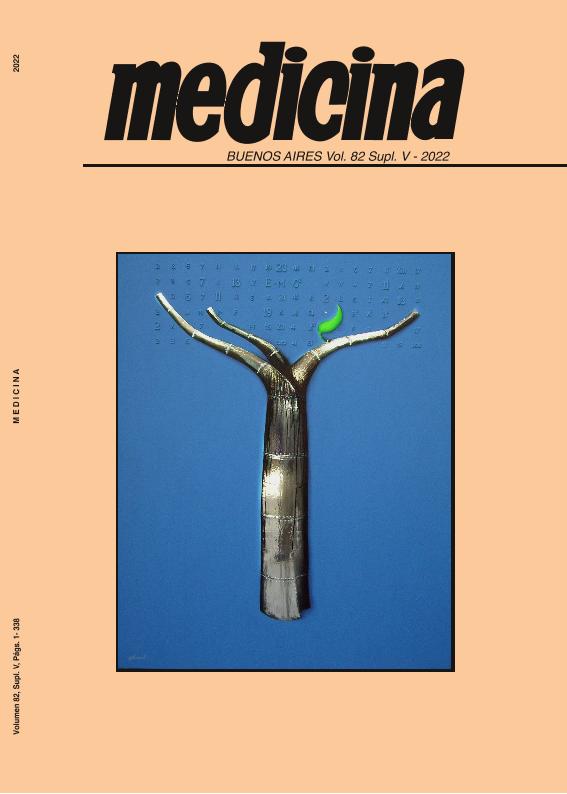Evento
Colorectal cancer screeening in Bahía Blanca: a qualitative-quantitative study of barriers and facilitators
Schenfeld, Yamila; Schernenco, Joel; Dopazo, Iñaki; Robles, Manuel; Bellando, Belén; Picardi, Gonzalo; Albanesi, Lucía; Esandi, María del Carmen; Reig, Maria Ernestina; Esandi, Maria Eugenia; Bruzzone, Ariana

Tipo del evento:
Reunión
Nombre del evento:
LXVII Reunión Anual de la Sociedad Argentina de Investigación Clínica; LXX Reunión Anual de La Sociedad Argentina de Inmunología; 3er Congreso Franco-Argentino De Inmunología y Reunión Anual 2022 de La Sociedad Argentina De Fisiología
Fecha del evento:
16/11/2022
Institución Organizadora:
Sociedad Argentina de Investigación Clínica;
Sociedad Argentina de Inmunología;
Sociedad Argentina De Fisiología;
Título de la revista:
Medicina (Buenos Aires)
Editorial:
Fundación Revista Medicina
ISSN:
0025-7680
e-ISSN:
1669-9106
Idioma:
Inglés
Clasificación temática:
Resumen
Colorectal cancer (CRC) is a major public health challenge all over the world. There is robust evidence showing that screening with fe- cal occult blood test (FOBT) reduces CRC- incidence and mortality. However, implementation of these programs faces many difficulties and fails to achieve expected coverage rates due to multiple barri- ers. Even though, in Argentina, CRC is the second type of cancer in incidence and mortality, its screening remains suboptimal. The aim of this research is to describe access rates to opportunistic CRC screening at a programmatic area (AP2) of the local health system in Bahia Blanca city between 2019 and 2021. It also explores factors that hinder or facilitate this access from the perspective of key ac- tors working at the municipal health system. A hybrid-design, com- bining quantitative and qualitative techniques, was employed. CRC screening access rates were estimated as the proportion of FOBT performed at AP2 primary health care centers (PHCC) per year upon targeted population. Qualitative assessment was performed combining two theoretical models: the Meta-framework of Imple- mentation Research and the Theoretical Domains Framework of Be- havior Change. Thirty five in-depth interviews were accomplished. The accumulative rate of FOBT in the studied period was ~ 4,6%, a low coverage value considering the national programme expecta- tions (40% in 4 years). Barriers most frequently mentioned were: 1. poor access to more complex studies (i.e colonoscopy) of positive FOBT individuals; 2. Lack of population awareness about CRC. Low adherence of the health care team to the screening recommenda- tions as well as poor formal medical training in this topic were also highlighted. Sense of belonging of the population to PHCCs and a positive implementation climate to incorporate screening as a rou- tine practice emerged as facilitators. This work, in addition to rele- vate the CRC screening in this area, will contribute to the design of strategies to reinforce it.
Palabras clave:
COLORECTAL
,
CANCER
,
SCREENING
,
BARRIERS
Archivos asociados
Licencia
Identificadores
Colecciones
Eventos(INIBIBB)
Eventos de INST.DE INVEST.BIOQUIMICAS BAHIA BLANCA (I)
Eventos de INST.DE INVEST.BIOQUIMICAS BAHIA BLANCA (I)
Citación
Colorectal cancer screeening in Bahía Blanca: a qualitative-quantitative study of barriers and facilitators; LXVII Reunión Anual de la Sociedad Argentina de Investigación Clínica; LXX Reunión Anual de La Sociedad Argentina de Inmunología; 3er Congreso Franco-Argentino De Inmunología y Reunión Anual 2022 de La Sociedad Argentina De Fisiología; Mar del Plata; Argentina; 2022; 268-268
Compartir



